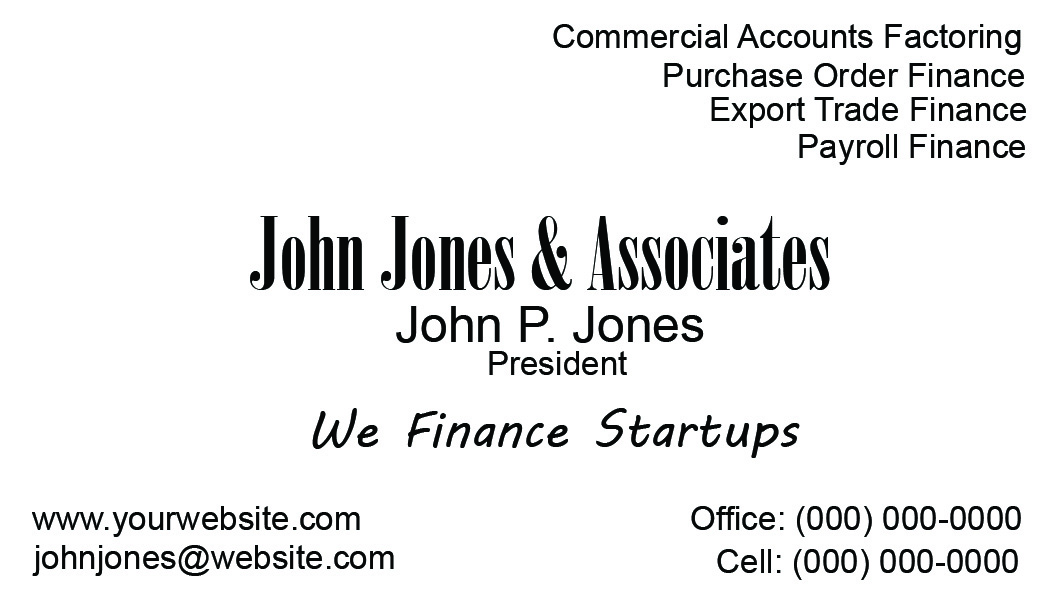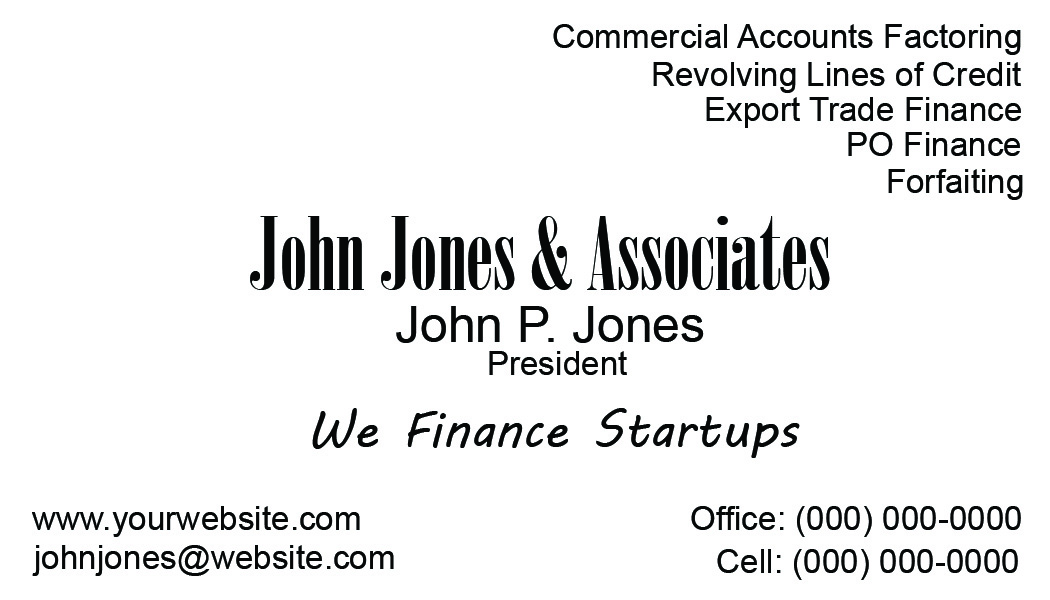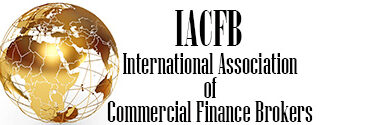
In today’s digital world, it’s easy to assume that business cards have fallen out of favor. But in the world of commercial finance consulting, your business, nothing couldn’t be further from the truth. Your business card continues to be a great way to introduce yourself face-to-face to…
- prospective clients
- those that offer networking opportunities
Business cards can be handed out in person when you’re at an event or they can accompany a direct mail marketing campaign to prospective clients. A quality business card makes you look (and feel) professional and provides all the information recipients need to find out more about you including quick directions to your powerful website and blog articles. As a freelance broker or commercial finance consultant, you will quickly learn how your business card and website often work hand in hand to generate an unlimited quantity of SQL or sales qualified leads.
Consider that business cards provide…
- Personal Touch: Despite the prevalence of digital communication, exchanging physical business cards still provides a personal touch to networking interactions. It allows for a more memorable and tangible connection between individuals.
- Professionalism: A well-designed business card reflects professionalism and attention to detail, which can enhance the credibility and trustworthiness of a factoring broker’s brand.
- Networking Opportunities: Business cards facilitate networking opportunities beyond just one-on-one meetings. They can be easily shared in group settings, conferences, and industry events where exchanging contact information digitally might not be as convenient.
- Ease of Contact: A business card provides all necessary contact information in one place, making it easy for potential clients or partners to reach out. This simplicity can be especially useful in situations where Wi-Fi or cellular connections are unreliable.
- Branding and Marketing: A creatively designed business card serves as a mini marketing tool. It allows factoring brokers to showcase their brand identity, logo, and tagline, effectively leaving a lasting impression on recipients.
- Memorability: A unique and well-designed business card is more likely to be remembered compared to a digital contact exchange. It can serve as a physical reminder of the factoring broker and their services, increasing the likelihood of future business opportunities.
- Cross-Platform Integration: Business cards can still play a role in connecting offline and online interactions. Including QR codes or NFC (Near Field Communication) chips on business cards can seamlessly link recipients to the factoring broker’s website, LinkedIn profile, or other digital platforms.
- Cultural Considerations: In some cultures, particularly in parts of Asia, the exchange of business cards is a deeply ingrained ritual that signifies respect and establishes rapport. Factoring brokers operating in global markets can leverage business cards to adhere to cultural norms and build relationships effectively.
- Brand Consistency: Consistent branding across all touchpoints, including business cards, reinforces brand recognition and trust. Factoring brokers can ensure their business cards align with their digital presence, creating a cohesive brand experience for clients and partners.
- Differentiation: In a sea of digital interactions, a well-designed business card can help factoring brokers stand out from competitors. Unique design elements, quality paper stock, or innovative features can make a lasting impression and differentiate the broker from others in the industry.
Important Card Design Characteristics for Factoring Brokers
When designing your business card, pay attention to…
Size and Background. We recommended using the standard design for U.S. business cards (3.5 in. by 2 in) so your card can be easily stored in wallets and business cardholders. Whether you are designing your card as a part time Agent or career oriented Freelance Commercial Finance Professional, we highly recommend a plain white background with black text. This is a highly “professional” business vocation so its best to avoid bright colors and designs.
Basic Contact Text. There are a few things every business card should feature, and in a particular order: Company name is followed by your first and last name, job title, and your contact details (phone number, email, web address, social handles).
Your Services. Whether you are designing your card as an part-time occasional agent or a professional freelance consultant, your business card is a very, very powerful networking tool and it’s important to list your “key” services. If properly designed, and because of your unique business services, your card is the perfect “ice breaker” when you meet a bank lending officer or local accounting professional.
Stock Texture. Don’t underestimate how a business card feels. If your selection of stock is too thin and flimsy, your card can feel cheap and leave your card receiver with the wrong impression. You want to choose a quality paper stock. Also, consider what finish your card should have. A high-gloss finish results in a shiny look and feel, a matte finish has a slight sheen and is softer, while an uncoated finish uses the paper’s natural texture.
Two Sample Business Cards
When you hand out you business card, you obviously are introducing yourself. However, even more important to your business, you are introducing your services. And, because the services provided by brokers, consultants and agents can significantly differ, the cards are a bit different as well.
SPONSORED AGENTS: Your business is 100% focused on factoring and should reference factoring-only products. They should reference accounts receivable factoring, purchase order finance, export trade finance, and payroll finance. These are the products featured on your WordPress Landing Page. Also, we recommend you say something about financing startups. For example…

As an agent, one of your primary targets for new clients will be “payroll” and newer companies as you network. Small companies that provide services to larger companies are your “low hanging fruit”. Your networking opportunities are typically informal. You are much more likely to get a great prospect or lead from enjoying a football game at a local sports bar than from attending an enormous international expo. Focus on your solutions on payroll and startup financing.
FREELANCE BROKERS and CONSULTANTS. For freelance career-oriented consultants, you will not only be handing out your business cards at formal networking events, you will also be including them with you mail stuffers and direct marketing campaigns. As it relates to networking, you will want to quickly “impress” the professionals you meet (bank lending officers and accounting professionals) with your knowledge. We recommend, for example, always include forfaiting or something similar on your card. While most bankers and career accounting professionals may know a bit about factoring, almost none that you meet will have ever heard of forfaiting and its use in international trade finance. Just including it on your business card can be a great ice-breaker when you field the answer to the question…“What is forfaiting?” It will immediately go a long way to establish your credentials as an “expert” in alternative commercial finance. See the example below.

Your business cards are often just the right catalyst to motivate a prospective client or future referral source to visit your website and download your FREE offer. Never attend any event without a good supply of business cards and it’s a very good idea to keep an additional supply in your car. You’ll never know when that well-designed business card results in a $1,000 a month factoring commission simply because you did forget to have it when the opportunity presents itself.
So while digital communication tools are essential in today’s business landscape, the traditional business card still offers numerous benefits for factoring brokers, including personalization, professionalism, networking opportunities, and brand reinforcement. By incorporating well-designed business cards into their marketing and networking strategies, factoring brokers can effectively navigate the digital age while maintaining a human touch in their interactions.




